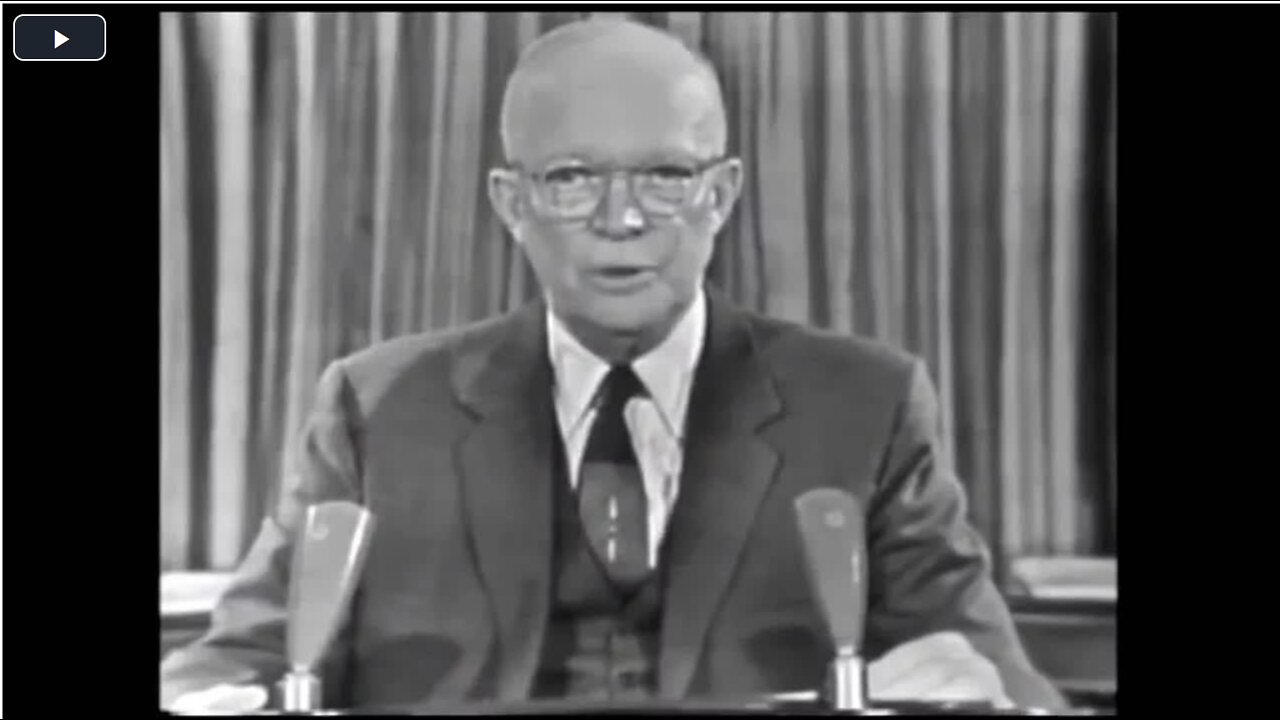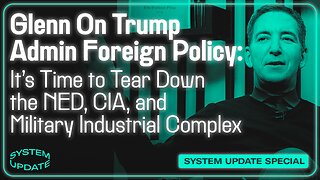Premium Only Content

Pres. Dwight D. Eisenhower Farewell Address, January 17th, 1961 (Military Industrial Complex)
R.A.W.W. - Raising Awareness World Wide
Published on Sep 5, 2016
https://altcensored.com/watch?v=QpV_NkcAtD0
Farewell Radio and Television Address to the American People,
January 17th, 1961 [Delivered from the President’s Office at 8:30 p.m.]
Eisenhower's farewell address (sometimes referred to as "Eisenhower's farewell address to the nation") was the final public speech of Dwight D. Eisenhower as President of the United States, delivered in a television broadcast on January 17, 1961. Perhaps best known for advocating that the nation guard against the potential influence of the military–industrial complex, a term he is credited with coining, the speech also expressed concerns about planning for the future and the dangers of massive spending, especially deficit spending, the prospect of the domination of science through Federal funding and, conversely, the domination of science-based public policy by what he called a "scientific-technological elite"
As early as 1959, Eisenhower began working with his brother Milton and his speechwriters, including his chief speechwriter Malcolm Moos, to develop his final statement as he left public life. It went through at least 21 drafts. The speech was "a solemn moment in a decidedly unsolemn time", warning a nation "giddy with prosperity, infatuated with youth and glamour, and aiming increasingly for the easy life."
""As we peer into society's future, we – you and I, and our government – must avoid the impulse to live only for today, plundering for, for our own ease and convenience, the precious resources of tomorrow. We cannot mortgage the material assets of our grandchildren without asking the loss also of their political and spiritual heritage. We want democracy to survive for all generations to come, not to become the insolvent phantom of tomorrow.""
The only general to be elected president in the 20th century, he famously warned the nation about the potentially corrupting influence of the "military-industrial complex". This is frequently mischaracterized as a criticism of the arms industry, which it was not. He in fact declared such an industry to be necessary. His concern was of its potential for corruption:
""Until the latest of our world conflicts, the United States had no armaments industry. American makers of plowshares could, with time and as required, make swords as well. But we can no longer risk emergency improvisation of national defense. We have been compelled to create a permanent armaments industry of vast proportions. Added to this, three and a half million men and women are directly engaged in the defense establishment. We annually spend on military security alone more than the net income of all United States corporations.
Now this conjunction of an immense military establishment and a large arms industry is new in the American experience. The total influence—economic, political, even spiritual—is felt in every city, every Statehouse, every office of the Federal government. We recognize the imperative need for this development. Yet, we must not fail to comprehend its grave implications. Our toil, resources, and livelihood are all involved. So is the very structure of our society.
In the councils of government, we must guard against the acquisition of unwarranted influence, whether sought or unsought, by the military-industrial complex. The potential for the disastrous rise of misplaced power exists and will persist. We must never let the weight of this combination endanger our liberties or democratic processes. We should take nothing for granted. Only an alert and knowledgeable citizenry can compel the proper meshing of the huge industrial and military machinery of defense with our peaceful methods and goals, so that security and liberty may prosper together.""
He also expressed his concomitant concern for corruption of the scientific process as part of this centralization of funding in the Federal government:
""Akin to, and largely responsible for the sweeping changes in our industrial-military posture, has been the technological revolution during recent decades.
In this revolution, research has become central, it also becomes more formalized, complex, and costly. A steadily increasing share is conducted for, by, or at the direction of, the Federal government.""
""The prospect of domination of the nation's scholars by Federal employment, project allocation, and the power of money is ever present and is gravely to be regarded.
Yet in holding scientific discovery in respect, as we should, we must also be alert to the equal and opposite danger that public policy could itself become the captive of a scientific-technological elite.""
-
 LIVE
LIVE
I_Came_With_Fire_Podcast
13 hours agoMy EURO Divorce | HOGG with a side of PAC | Foreign FUNDS Fudged
244 watching -
 37:44
37:44
Glenn Greenwald
9 hours agoGlenn On Tearing Down the Military Industrial Complex, Exposing Pro-Israel Indoctrination, and More | SYSTEM UPDATE #411
80.6K93 -
 4:04:20
4:04:20
Nerdrotic
9 hours ago $43.30 earnedAmazon Takes 007! Hollywood is Lost, Disney Cancels WHO? | Friday Night Tights 342 /w ItsAGundam
150K27 -
 43:27
43:27
Tucker Carlson
8 hours agoRay Dalio: America’s Hidden Civil War, and the Race to Beat China in Tech, Economics, and Academia
136K169 -
 56:56
56:56
Candace Show Podcast
8 hours agoEXCLUSIVE: Taylor Swift Will Be Deposed. | Candace Ep 150
133K135 -
 1:03:52
1:03:52
IsaacButterfield
5 hours ago $2.28 earnedRepublican Vs 25 Transgender Activists | Jewish Outrage | Lizzo Loses All the Weight
37.8K11 -
 1:10:23
1:10:23
Edge of Wonder
9 hours agoChinese Biochips Hacking Minds? Quantum Control & Journey Song Mandela Effect
60K7 -
 2:15:46
2:15:46
Quite Frankly
12 hours ago"Ghosts, Robotics, and OBE's" ft. Dr. Albert Taylor 2/21/25
57.9K17 -
 55:52
55:52
LFA TV
1 day agoMaking Germany Great Again | TRUMPET DAILY 2.21.25 7PM
42.4K8 -
 1:52:26
1:52:26
2 MIKES LIVE
8 hours ago2 MIKES LIVE #183 Open Mike Friday with Hannah Faulkner and Adelia Kirchner!
28K